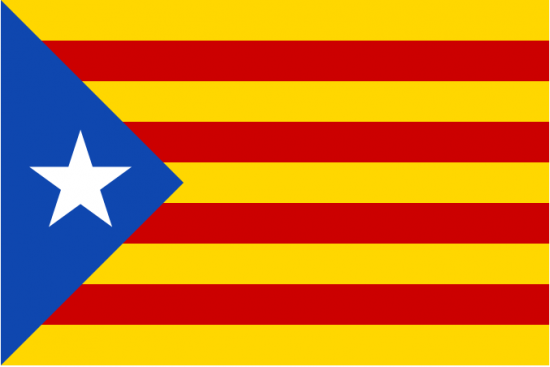This interview was originally published at the Fleming Foundation.
Prof. Bassani, there was a mass demonstration in Barcelona on Friday. Hundreds of thousands took to the streets to proclaim their desire for independence. Why, with all the crises in Europe—Syrian migrants, EU economic woes, and the Greek bailout, to name just two—are people in northern Spain agitating for independence?
First of all, it is not people in northern Spain, it is the Catalans that are making a bid for their own independence from Spain. Now, the Catalans are not easily defined as a specific ethnic group, as half of the people in Barcelona do not even have Catalan parents, that is, they are Catalans by choice, more than by blood.
The estimated number of people who went on the streets on September 11th 2015, was 1.4 million, pretty amazing as the whole population is no more than 7.5 million. They were commemorating “la diada,” or national day of Cataluña, that is, the sad day in 1714 when the Catalans lost all their liberties.
Only a few years ago, the independentists in Cataluña were just a few thousands. A clear majority of the Catalans thought that if they could just get what the Constitution of 1978–the post-Franco fundamental law – promised them, i.e., “autonomy”, they could be satisfied.
The current European crises, instead of distracting the people, are rather the fuel for this push for independence. By now, several things are clear to every rational observer. The European Union has no existential import and it is bound to collapse pretty soon. The migrant crisis is fired up by this German-led Europe (one day the Angelic lady opens up all borders and the next she shuts the whole country). Germany will never stand up against Athens, and she will never be proactive against immigration.
Overall, there are only the nation-states in the international arena. Madrid is the problem, and Brussels will never be the solution for the Catalans.
What are the economic issues at stake?
Economic issues are of paramount importance, as usual. Interests are the key of any political struggle, if there is any lesson of watered-down Marxism that is not entirely lost it is this one. Ideology is the flag of the political classes in the struggle for power. As a realist political scientist, I perfectly understand that in this moment there are powerful interests behind elites and masses in this fight against Madrid.
The economic crisis of 2009, which hit continental Europe much harder than any other part of the planet, was the beginning of the end for the European order as we know it. Cataluña will be the Berlin wall of Western Europe. In fact, a quarter of a century ago Eastern Europe was changed forever, but nothing at all happened in the West. Former “capitalist” governments went on just increasing taxation, territorial redistribution, and government intervention. No boundaries were even questioned.
That is because the Cold War was, in fact, the civil war of the left: the social democrats defeated the communists with the help of Ronald Reagan and some naïve American conservatives. Communism was placed in the dustbin of history and socialism began its long and peaceful march to subdue western society.
Well, there is only one way to reverse this trend: a total dismantling of the old borders, and the creation of new ones. The political divide between conservatives and liberals (in Europe classical liberals and social democrats) is on the surface, and will never make any real difference.
Is this just another case of greed? Northern Spain is richer than the rest of the country?
If greed is the simple desire to hold onto what is legitimately yours, then you should just surrender your wallet to the highwayman, whenever he stops you. There is something called “fiscal imbalance.” Such a disparity is very simple to determine, as it is the arithmetic difference between how much the central government gets from a territory, and how much it gives back in terms of services. In 2012 for Cataluña, it was about 8.8 %, which means some 2,500 euros per person. The Catalans keep saying that they are the most exploited people in the world. While this happens to be untrue – Rome extorts from Lombardy 60 billion a year, i.e., more than 6,000 euros for every inhabitant of that once rich area – it is in fact true that while the Lombards are quiet as mice, the Catalans are the most unsatisfied and vociferous people in Europe.
Cataluña might be richer than some areas of Spain, but she is paying such a disproportionate share of taxation that her legitimate claim to her own wealth are denied by the system.
It was the great Carolinian political theorist, John C. Calhoun, who wrote in 1849: “The necessary result … of the unequal fiscal action of the government is to divide the community into two great classes. One consisting of those who … bear exclusively the burthen of supporting the government; and the other, of those who are the recipients of their proceeds, through disbursements, and who are, in fact, supported by the government; or, in fewer words, to divide it into tax-payers and tax-consumers.” (Disquisition on Government) As far as the Spanish state is concerned, the Spaniards are free-riding on the Catalans, and this is a fact that cannot be hidden by any political metaphor.
Are there cultural/historical issues involved?
Of course, many observers would stress the profound historic roots of this conflict between Spain and Cataluña, which are clear in the 20th century. Barcelona was the heart of the anti-Franco movement, during the civil war, and fascism and centralization went hand in hand during the regime that lasted 40 years. Actually, Franco was fighting as much against “communism and anarchism,” as he was suppressing any chance for autonomy and self-government for Catalans and Basques.
How important is the language issue? Roughly half the population, it is claimed, speak Spanish as the primary language, but over 40% speak Catalan. Isn’t this just a dialect of Spanish?
What is a language? A language is a dialect with an army and a passport, to paraphrase Max Weinreich famous quote. The political importance of the language issue is rather peripheral in my analysis, as the Catalan identity is only partially due to ancestry and ethnolinguistic traditions. A Catalan is someone who feels exploited by Madrid, and who feels his future imperiled by the union with Spain. There are many people who speak Spanish from dawn to dusk (or from dusk to dawn as Barcelona is a city that never sleeps …) and will vote for independence.
Is the movement for Catalan independence something new or does it have a long history?
The movement is very ancient but it has gained momentum only in recent years. Before 2008 it was a cultural, and “defensive” movement with no political weight. Of course, in light of the classic tradition of the European romanticism, Cataluña is a nation, as it has a language, a people, and a common history. It is a nation without a state, like Kurdistan or Veneto, Scotland or Lombardy … and a myriad of others. These elements have their importance, but what is really relevant to the current cirucmstances is that a clear majority of Catalans wants to become a separate political community.
I was in Barcelona, as a Lombard observer, during the unofficial referendum on self-determination on November 9th, 2014. Clearly it was non-binding, but almost two million votes were casted in favor of the birth of the new state, that means that, given the usual electoral turn outs, the Catalans have sealed an iron majority for their cause. Madrid knows this very well, and the Spanish government will do anything to prevent an official vote.
If an election were held today, what would be the outcome?
The Catalans will vote in ten days (September 27th) in their regional elections. If a clear secession majority emerges in the Catalan Parliament, the process will begin for good. And there seem to be very little room for Madrid, as force and denial do not seem options anymore.
What are the larger issues and deeper principles at stake?
There is only one political issue, in America, in Europe, and everywhere: The size of government. We are cursed by bigness. The political philosophy of the person in command does not make any difference. Ronald Reagan won the presidency in 1980 on a classic liberal platform, “farewell to welfare,” and with a huge consensus in the country. Eight years later, he left the federal government both far larger and more indebted than he had found it. This was not by ill will or incompetence, but because once a state has reached a certain critical mass, it does not seem possible to restrict centralization and reduce the weight of government bureaucracy. Then there is only one way out: The reversal of the centralizing tendencies that have been at work for the past 700 years. That is, Leviathan must be broken down in a myriad of small size governments that will never be able to become oppressive because of scale and overlapping jurisdictions. In a few words, we must go back to be servants of several masters competing for our allegiance. In the US we could probably still hope for a swing of the pendulum of power in favor of the states, in Europe the time has come for a peaceful secessionist wave.
Marco Basani is a professor of the history of political thought at U. of Milan who has spoken at Abbeville Institute events and is currently writing a book on John C. Calhoun.







